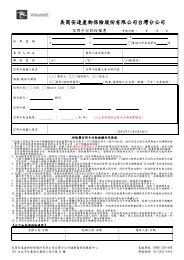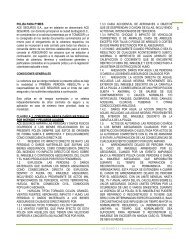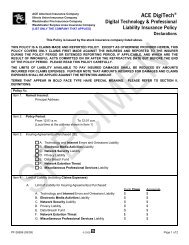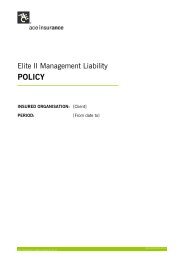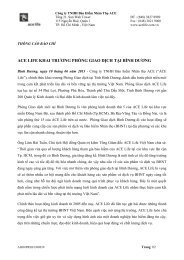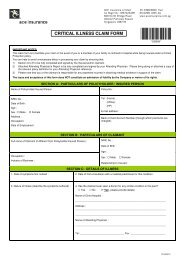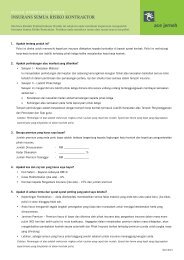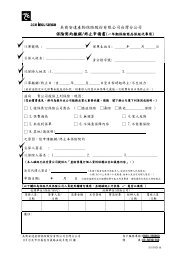REPUTATION AT RIsk - ACE Group
REPUTATION AT RIsk - ACE Group
REPUTATION AT RIsk - ACE Group
You also want an ePaper? Increase the reach of your titles
YUMPU automatically turns print PDFs into web optimized ePapers that Google loves.
25%20%15%10%5%24%AutomotiveUtilitiesReal estateBuilding materialsHealthcare0%Reputation by region: A north-south divideMid-sized companies (US$500m – US$1bn)on reputational risk?The survey reveals some striking differencesbetween respondents from the UK, France,Germany (grouped for the purposes of thisanalysis as northern Europe) and Beneluxcountries, compared with those from southernEurope (Italy and Spain) and MENA and Turkey.Culture and the value of reputation% respondents who strongly agree that reputation is their company’smost significant asset80706050403020100Respondents from all countries think reputation isan important asset. But this is particularly markedin the MENA countries, where 68% of executivesstrongly agree with this notion. Almost half ofexecutives from southern Europe also stronglyagree, versus a significantly smaller proportion(40%) of executives from northern Europe.This difference most likely comes down tocultural perceptions. Southern Europeancountries 60 are also especially sensitive to the riskof damage to customer relationships caused 52 byreputational 50 issues.On 40 potential sources of reputational risk facing36their companies, the southern European andMENA 30 executives in the survey are particularlyconcerned about keeping up with the pace ofregulatory 20 change (43% cite it as a top concern).One issue in faster-growing markets such as Turkeyor 10 MENA is the speed of implementation of newlegislation. Emerging market regimes, generally,014Small companies (US$250m – US$500m)Large companies (over US$1bn)37%BeneluxNorthern Europe40%4449%Southern EuropeMENASmall companies (US$250m – US$500m)Mid-sized companies (US$500m – US$1bn)Large companies (over US$1bn)68%may implement change rapidly or unexpectedly,which can make it harder for businesses toanticipate developments and to remain compliant.By contrast, northern European companies mayhave had greater past experience of multinationalbusiness and of managing multiple complianceprogrammes, and these issues may be a morefamiliar challenge.For northern European respondents, pooremployment conditions around the world areviewed as a key source of reputational risk. Thisis particularly notable for Benelux executives,51% of whom worry about this issue. This mayreflect these countries’ greater integration intoglobal markets, in terms of their supply chains andtrading links.When it comes to managing reputational risk, thenorthern European executives acknowledge it is adifficult area, but they tend to be more confidentin their capabilities. For example, half of them(49%) say their companies are very effective atidentifying threats to reputation, whereas only34% of southern European and 44% of MENAexecutives feel the same degree of confidence.Similarly, 36% of northern European executives saythey are very effective at managing reputationalrisk across the supply chain, but only 26% ofsouthern European executives feel the same.Interestingly, although they place great valueon reputation, only 32% of southern Europeancountries strongly agree that they monitor theirreputations on an ongoing basis. This compareswith 40% in northern Europe and as many as 47%in Benelux who do so.Overall, it is the northern European countries thatseem to have been more active in developingstrategies to manage reputational risk. It is clear,however, that companies from all regions have along way to go in tackling this issue.Concerns about poor employmaround the worldHeightened focus on fraud anin foreign market subsidiariesDifficulty keeping pace with reDifficulty managing product qpractices across extended supCorporate governance failuresfinancial or reporting irregularAggressive tax avoidance/taxbusiness environmentIncreasing stakeholder and meof business practicesConcerns about failure to protHigh-profile product recall incIncreasing corporate social reexpectationsConcerns about discriminatioIncreased attention on executiInstilling a culture of reputatiothroughout the companyIdentifying threats to reputatiCrisis managementPutting in place governance smanage reputational risksEnsuring that reputational risacross the entire supply chainRestoring reputation followingQuantifying the financial impaMeasuring external perception






